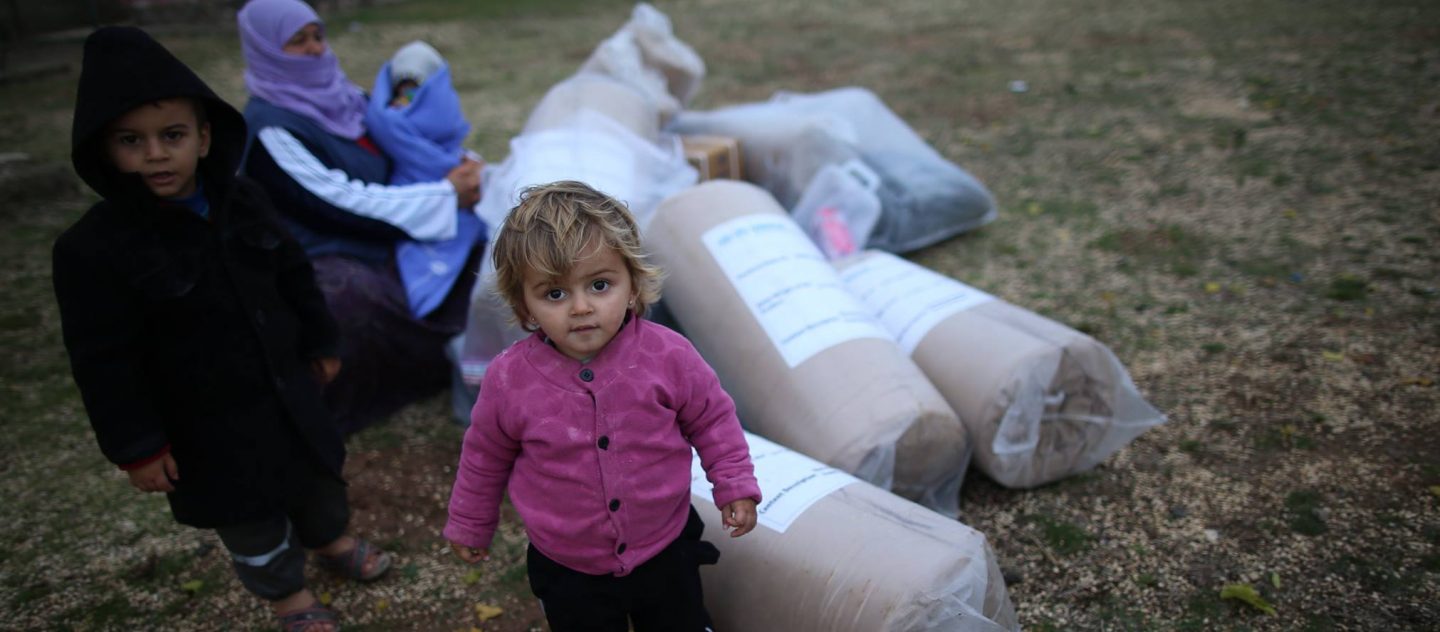Key Figures
Turkey is home to the world’s largest refugee population, with almost 3.6 million Syrians under temporary protection and close to 370,000 refugees and asylum-seekers of other nationalities.
Key locations
Over 98 per cent of refugees in Turkey live in urban, peri-urban and rural areas, while the remaining refugees (less than 2%) live in Temporary Accommodation Centres.
- The Government of Turkey leads the refugee response with UNHCR providing capacity development support. Turkey hosts the largest number of refugees in the world and its response to refugees has been generous and positive. The national legal framework, namely the Law on Foreigners and International Protection and Temporary Protection Regulation, provides refugees and asylum-seekers with access to education, health care and social services, upon registration with the authorities.
- In supporting the refugee response in Turkey, UNHCR works in partnership with public institutions at the national, provincial and local levels, including municipalities, with national and international non-governmental organisations, United Nations sister agencies, the private sector, as well as with refugees and host communities. UNHCR Turkey has a country office in Ankara and field presences in Istanbul, Izmir, Gaziantep, Hatay, Şanlıurfa and Van.
- As the Refugee Agency, UNHCR co-leads with UNDP the Regional Refugee and Resilience Plan (3RP) in response to the Syria crisis with an appeal of USD 1.174 billion for Turkey in 2020. The 3RP provides a strategy, plan and resource requirements to continue to support to the Government of Turkey’s refugee response. The plan is based on Turkey’s comprehensive legal framework for international and temporary protection and policies of harmonisation and inclusion of refugees in national services. UNHCR also chairs the International Protection and Migration Results Group of the Turkey 2016-2020 UN Development and Cooperation Strategy (UNDCS).
Strategic Directions and Interventions
Turkey’s legal framework for international and temporary protection forms the basis of UNHCR’s strategy and priorities in 2020. More specifically, the agency pursues the following key strategic directions:
- UNHCR promotes access to and the provision of protection, by working in close partnership with the Directorate General of Migration Management (DGMM), the Turkish Coast Guard and Land Forces, the Gendarmerie General Command, the Ministry of Justice, and the Union of Turkish Bar Associations (UTBA), advocating for the admission of persons in need of international protection, their access to fair and efficient national asylum-procedures and promoting procedural standards and safeguards. Cooperation with DGMM to support continuous registration and international protection procedures remains a priority.
- UNHCR works to support access to quality services of refugees with specific needs. UNHCR focuses on child protection services (in particular for unaccompanied or separated children), the prevention and response to Sexual and Gender-Based Violence, as well as social services for persons with specific needs. UNHCR aims to expand its cooperation with the Ministry of Family, Labour and Social Services, in particular its Social Service Centres, as well as support the identification, referral and response to refugees with specific needs, working with civil society partners.
- In an effort to promote social cohesion and harmonization, UNHCR supports DGMM in the implementation of the National Strategy on Harmonization and the National Action Plan and engages with local administrations, municipalities, imams and mukhtars to strengthen interaction and social cohesion between refugees and host communities. A priority for refugees in this regard is Turkish language courses, provided through Public Education Centres (PECs). UNHCR also implements social cohesion activities and small scale Community Support initiatives aimed at encouraging dialogue and interaction between refugees, host communities and service providers.
- UNHCR promotes and prepares for durable solutions for refugees. This entails working with public institutions, in particular the Turkish Labour Agency, İŞKUR, private companies and development actors to improve access of refugees to opportunities for self-reliance. UNHCR works closely with the Presidency for Turks Abroad and Related Communities (YTB) with regard to higher education and language training for higher education preparation. UNHCR also continues to process cases of individuals with the most acute vulnerabilities and protection risks for resettlement purposes; to advocate for safe complementary pathways such as family reunification; and to monitor the voluntary nature of spontaneous returns in cooperation with DGMM.
- Throughout its work, UNHCR has prioritized multi-stakeholder support to the refugee response, by engaging with a range of partners, including development actors and the private sector, and strengthening coordination and engagement with UN and civil society partners. Efforts are made to align coordination and planning frameworks, including the 3RP and UN Sustainable Development Cooperation Strategy, with objectives of the Global Compact on Refugees and engagement towards realization of Sustainable Development Goals. UNHCR strives to make increased use of media. Maintaining, growing and diversifying its donor basis remains a priority.
Global Compact on Refugees and Global Refugee Forum
In December 2018, the UN General Assembly affirmed the Global Compact on Refugees, a framework for more predictable and equitable responsibility-sharing, recognizing that a sustainable solution to refugee situations cannot be achieved without international cooperation. The objectives of the Global Compact on Refugees are to ease pressure on host countries, enhance refugee self-reliance, expand access to third country solutions and support conditions in countries of origin for return in safety and dignity.
Turkey was one of five co-convening countries of the Global Refugee Forum which took place on 16-18 December in Geneva. The delegation from Turkey was headed by the President of Turkey, several Ministers and high-level officials who participated in plenary sessions, high level dialogue discussions, spotlight sessions, and speaker’s corners. From Turkey some 50 good practices of all areas of the refugee response were shared, primarily in education, higher education, protection, registration, health, access to self-reliance, including in the agricultural sector, social cohesion, and pledges in education, micro-credit solutions, statelessness, refugee rights and youth activities were announced.

